Society always have its stereotypes. However, in the Western world, people are encouraged to not discriminate against people with different backgrounds. Although everyone has some sort of ideology of people with different backgrounds, people tend to avoid being open and direct about it. In the drama, Misaeng, discrimination can be blatantly seen as the main character, Jang Geu-rae, suffers at his workplace due to his educational status. This is a reflection of the current office environment in Eastern countries and especially in Korea. This essay will give a deep insight on Korean’s view in the importance of education and status.
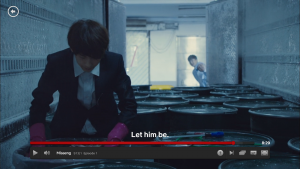
In the first episode, Jang Geu-rae is given an internship in one of the largest company in Korea. He got his position through some sort of relationship with the executives which is one of the reason that he is discriminated against. The biggest flaw that leads to him being excluded from his fellow interns is that he did not graduate high school nor received any post secondary education. In fact, he only has a General Equivalency Diploma, GED, which is considered to be the bare minimum for any person. In this episode, his colleagues played pranks on him as well as talked behind his back.
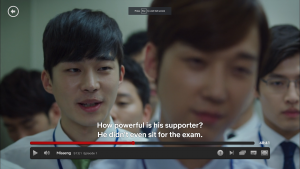
Korea as a society has the idea that success requires a good education. This thought is ingrained in them as they only considered people that graduate from top universities such as “Seoul National University, Korea University, and Yonsei University” a success (VanderGast et al. 2015, 4). Because of this philosophy, children in Korea live hellish lives during their education. In fact, due to importance of education, many students “reported high levels of stress in their daily lives” as well as “suicide [being] the leading cause of death among teens” (Hu, 2015). Since education is valued so deeply, the people that graduate from the top universities are given great status and will be respected. In the case of Jang Geu-rae, his lack of education is a valid reason for his coworkers to marginalize him even though he has not been given the opportunity to prove himself. Even when he is given a job that he succeeds in, such as the scene where he keeps his client’s company while his department chief, Mr. Oh, is stuck in traffic, he is still not recognized for his efforts. This prejudice against Jang Geu-rae is a representation of how important education and status is in the Korean society.
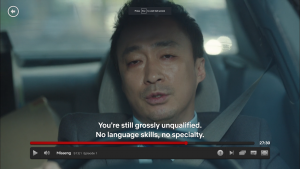
The reason why Korea values education and status so highly is a reflection of their history. “It is commonly accepted that the [Joseon] dynasty… permanently Confucianized Korean civilization, in effect rendering Korea’s premodern culture inseparable from Confucianism itself” (Kyung, 2010, 72-73). When Joseon first came into power, Jeong Do-jeon with King Taejo abolished the previous religion of Buddhism that was held by the Goryeo dynasty (Lee et al. 1997, 279). They implanted Confucianism as the new religion which completely changed the structure of politics. This new structure requires scholars to take a standardized exam in order to become officials (T’aejo sillok, 273). This exam is similar to how students in today’s Korea take an exam to see what universities they can get into. When they are able to go to a prestigious university, it is similar to becoming an official in the Joseon era. Hence, it is shown that “educational status and hierarchy [is a] part of the Confucian philosophy” in which Koreans have incorporated in their subconscious minds due to their history (VanderGast et al. 2015, 4).
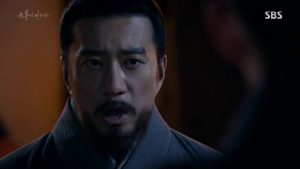
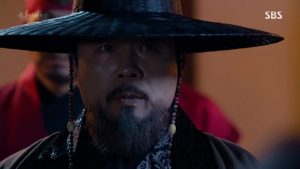
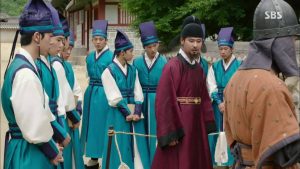
In conclusion, the discrimination Jang Geu-rae faced in Misaeng can be attributed to the lack of education and status he has. This discrimination is a reflection of the Korean society in that Koreans take status and education to high regards. The reason they value these qualities is because of the Confucius history they have. With the rise of Joseon dynasty, Confucianism became the dominant philosophy which leads to valuing education much more than before. This ideology carried over to the current society. In a way, today’s society is a reflection of the history that Korea has faced.
Question:
What are some other reasons that Koreans value education and status so deeply?
As the current society is slowly deviating from the discrimination due to the increase in multiculturalism in Korea, do you think that Koreans will change their ideology regarding education and status? Why or why not?
Bibliography:
Hu, Elise. “The All-Work, No-Play Culture of South Korean Education.” Parallels. April 15, 2015. https://www.npr.org/sections/parallels/2015/04/15/393939759/the-all-work-no-play-culture-of-south-korean-education.
Kim, Won-seok, dir. Misaeng. Number 3 Pictures, 2014. https://www.netflix.com/watch/80165296?tctx=0%2C0%2C2ccd12e1-70d7-46d9-8aae-7ac139b241fa-124328052%2C%2C.
Kyung, Moon Hwang. A History of Korea. New York: Palgrave Macmillan, 2010.
Lee, Peter H., WM. Theodore de Bary, Yongho Ch’oe, and Hugh H. W. Kang. Sources of Korean Tradition Volume One: From Early Times Through The Sixteenth Century. New York: Columbia University Press, 1997.
Shin, Kyung-soo, dir. Six Flying Dragons. Redwoods, 2015. https://www1.ondramanice.io/drama/six-flying-dragons-detail.
T’aejo sillok. “King T’aejo: Founding Edict 1:43a-45a.” Edited by Lee, Peter H. and WM. Theodore De Bary. Sources of Korean Tradition Volume One: From Early Times Through The Sixteenth Century. New York: Columbia University Press, 1997. 272-274.
VanderGast, Tim S, Sejal Parikh Foxx and Claudia Flowers, Andrew Thomas Rouse, Karen M. Decker. “A Window Into South Korean Culture: Stress and Coping in Female High School Students.” Journal of School Counseling 13, no. 13 (2015): 1-29.
Hi Martin, I agree with you that the drama reflects the sort of education system South Korea values. To answer your first question, I believe that education status is not only important in ROK, but also important inother developed societies. One reason behind this is that with areas of a large population and a competitive job market, it is difficult for employers to identify a student’s value other than checking both their educational and work experiences. They are arguably the most simplest and convenient way of determining someone’s worth. South koreans have been raised with a mindset of thriving in terms of learning and attaining skills that will help them find an easier job. The idea that someone with just a GED who gets opportunity to stand in the same line as the other interns who have more academic accomplishments can understandably be unfair. However, what appears to be undervaluing is the idea of connections. Nonetheless, pressures of living a sustainable life is high because of the hardships of doing better than others who also work hard. Unless the economy dramatically shifts its attitude, Koreans will never change their ideology regarding education and status. What structures South Korea’s economy are those who work endlessly to produce positive results. The incentive to do well in order to live a happy life is strong in Korea, and to alter their ideology would be to alter their society as a whole.
Hello Martin,
I agree with your conclusion that discrimination in the Korean workplace, based on ones educational status, largely stems from Korea’s long history of following Confucian values on education. Which is illustrated in Misaeng, through the hardships of Geu-rae. However, I think in Geu-rae’s case it is not only his lack of educational status that causes the discrimination but also: his timing in joining the company (which was after the usual time of when interns are hired), the way he dressed (a used suit which didn’t completely fit him), and even the way he interacts with others (shy and submissive). These qualities made him an ‘outsider’ from the rest of the interns. And it seems that in Korean society it is better to be the same as everyone else than to stand out and be different. Something largely different from North American ideals.
To answer your questions:
1)
It could be that the standards expected of those going to University are so high that those that make it become overly self satisfied with themselves and those that don’t become bitter to those that have received a higher education—creating a deep impact on how people value education. It could also be the cost of education. Since the majority of those that go on to further education are from mid-to-high income families; leaving those from lower income families to go straight into the work force. This gives a sense of elitism to those who have gone to higher education.
2)
I think Korean society will, most likely, continue to discriminate those based on their educational background. However, as Korean society becomes more diversified this type of discrimination will, most likely, be lessened. And instead, discrimination will probably be more focussed on other things such as what country they are from (like how Koreans act towards North Korean Refugees).
Education and status are important in many Asian countries as well as the social Hierarchy due to the Confucius history like you said. Education and examination system are ways to select the best from a bunch of people. It is also a significant way for poor people to get into upper-levels in the society. To some extent, status and education show the capability of a person and whether he has the skills to finish each assignment assigned by the leader. They are the easiest way to evaluate a person in the workplace. I don’t think Korea will change their ideology regarding education and status in a short period. The multiculturalism in Korea and the ideas from western countries won’t simply change the system and the environment. Management may change their stereotypes and pay more attention to capability itself but it will take a long time to do that.
Martin, you are right to point out Koreans’ stereotyping based on one’s education. And that co-workers stereotype Geu-rae because of his lack of education (compared to those surrouding him) certainly is the case.
However, I would like to suggest that (Michelle similarly pointed out) it is not just becase he is a high school graduate (passing GED is considered being a high school graduate), but because he was able to join the company through his connection. We call this kind of case “parachute”–getting a position through nepotism and network rather than solely by one’s efforts. So when you see Geu-rae from others’ perspective (considering that they don’t know any of his background), he might be just a rich and fortunate kid who got the position–when others spent so much time and money for that position. Koreans are also encouraged not to discrimiate against people, and if Geu-rae had been hired the way other people were, he wouldn’t have been so much bullied. So perhaps taking this into consideration could help understand that others’ reaction is not so abnormal.
Hmmm. Just a couple quick thoughts just letting you guys know I did stop by and check out the blog. 1) Hwang is the family name, not Kyung. Be careful how you refer to scholars. 2) tomorrow’s lecture should illuminate more on education. 3) good start by all who commented and good job by Martin in setting up the discussion.
Hi Martin,
1) As you and others have pointed out in the discussion, while the Confucian history has played a role in shaping Korean values, such as education and (social) status. There are many (social, political, economic, cultural, etc.) factors that adds up to the way one moves up the social ladder. As Michelle pointed out in her discussion: Geu-rae’s timing in joining the company and the way he carries himself interacting with others, puts him in a difficult position with society’s expectations, which can be the tip of the iceberg for him, at this moment. I think through those scenes in the drama, the viewers can see how the demands in society, that holding a high school standing could get you so far, but even those who hold higher educational status, need to be on their feet as well to meet the company’s expectations.
2) As many have pointed out in the discussion, it is difficult to change the minds of others about their ideologies and conceptions of the pursuit of higher education reflected upon one’s social status/hierarchy. Gaining more exposure could help diversify the ongoing multiculturalism in South Korea, that would guide others to be culturally aware of others .